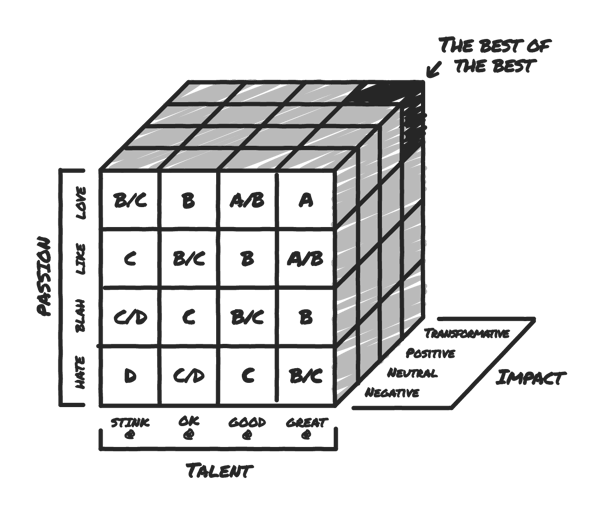Strategic Leadership: Navigate the 90/80/70/60/50% Principle for Maximum Impact
In the dynamic landscape of organizational leadership and development, Founders/CEOs play a pivotal role in setting the vision and strategic direction for their companies. The 90/80/70/60/50 principle offers a guiding framework for how everyone from the founder/CEO on down should strive to allocate their time to doing work that significantly impacts the organization’s trajectory and aligns closely with their personal strengths and passions.
Central to this approach are two big ideas. The first is that founders/CEOs should strive to allocate at least 90% of their time to activities that drive organizational progress, they love doing, and are great at doing.
The second is that while we would love for everyone in the company to be able to allocate 90% of their time to things they love doing and are great at doing, the truth is that percentage declines as we move down the organizational ladder.

The further down the ladder a team member is, the more likely they are to still be learning about their strengths, weaknesses, interests, and passions. This ensures that as individuals ascend within the organization, there's a greater focus on engaging in work they excel at and find fulfilling, thereby minimizing time spent on tasks that are less aligned with their preferences and strengths.
If you haven’t read our guide to organizational structure yet, we highly recommend it as a companion to this article.
Leadership at the Helm: Strategic Vision and Impact (90%)
Founders/CEOs of Stage 5 companies should be striving to dedicate at least 90% of their time to doing work they love doing, they are great at doing, and which drives the company’s long-term vision and strategic objectives. This hopefully includes crafting the organization's future, engaging with key Ideal Stakeholders, and making decisions that shape the company's direction.
Being the founder/CEO of a thriving organization is a demanding job that is almost impossible to do well if the vast majority of your time is not spent doing work that you’re great at and love doing and where the results are clear and compelling.
Thriving organizations recognize the value of leaders focusing on their core strengths, driving substantial impact. In a Stage 5 Company, a founder's time is best spent on high-level strategic initiatives, innovation, and ensuring that the organization's values and culture resonate with every team member and decision.
Empowering the C-Suite through Execution and Alignment (80%)
C-Suite executives, including second-in-command roles, should strive to dedicate at least 80% of their time to doing work they love doing and are great at doing. Better yet, work that drives the organization forward.
Reporting directly to the founder/CEO, these leaders oversee several Core Functions. They have the ability to envision and execute strategies with time spans of responsibility (TSRs) of over 2–5 years. Their role is critical in translating the founder's vision into operational success, requiring a deep understanding of both the organization's goals and the nuanced dynamics of their teams.
In our model of organizational structure, Strata indicate work complexity and decision-making responsibility increasing from 1 (1–3 months) to 5 (5–10 years). C-Suite members are in Stratum 4, the organizational layer closest to the founder/CEO, who sits in Stratum 5.
At this fourth stratum, these executives have refined their abilities, achieved a clear understanding of their strengths, weaknesses, and areas of interest, and are recognized for their high degree of self-awareness and understanding of team dynamics. Many are precisely where they aspire to be, while some aim to pursue the path of founding their own ventures or ascending to CEO roles.
Strategic Leadership and Operational Excellence (70%)
In Stratum 3 of a Stage 5 company, Core Function leaders — such as those who head up Marketing, Product Development, Engineering, and Client Success — should strive to allocate at least 70% of their time to tasks that leverage their strengths and fuel their passions, highlighting the role of job satisfaction and personal competency.
Tasked with developing their Core Function’s expertise, leading complex initiatives, and enhancing cross-functional collaboration, these leaders play a pivotal role in aligning projects with the company's vision over the next 1–2 years. Their ability to navigate role complexities and integrate their departments with the broader organizational goals is key to propelling the organization forward.
Within Ninety's organizational framework, Stratum 3 leaders are crucial for their ability to adeptly navigate the complexities of their roles, driving the success and integration of their departments into the larger organizational fabric. They are selected based on a proven track record of passion-driven excellence and their capacity to nurture an environment that encourages teamwork and innovation.
Maximizing Engagement and Aligning Strengths with Organizational Goals (60%)
Founders play a pivotal role in guiding their teams, ensuring that at least 60% of each of their Stratum 2 team leaders is allocating at least 60% of their time to working on meaningful tasks that align with their strengths and the broader goals of the organization.
This strategy involves carving out developmental pathways for both emerging leaders and vital individual contributors, such as engineers and project managers. By deepening their expertise and involving them in strategic projects, founders lay the groundwork for innovation and cohesive teamwork through cross-functional collaborations.
To facilitate this, Stratum 2 Seats are structured with TSRs ranging from 90 days to 12 months, focusing team members on achieving quarterly objectives, or Rocks, that are critical for advancing the founder/CEO’s vision.
Our company is called Ninety in part because of our need to help simplify the hard work associated with turning ambitious goals into manageable 90-day increments, ensuring the entire organization moves in unison toward hitting at least 90% of these targets. This approach underscores the importance of aligning individual contributions with organizational needs, thereby reinforcing each person's role in the collective success and strategic progression of the company.
The Early Stages: Navigating the Learning Curve (50%)
At the heart of an organization are entry-level and individual contributor roles designated as Stratum 1 Seats. Healthy organizations focus on structuring and hiring for these Seats with the goal that individuals are allocating at least 50% of their time to doing work they love and are great at doing.
These seats have TSRs that range up to 90 days, but the vast majority of Stratum 1 Seats have roles, accountabilities, and responsibilities that require checking in either daily or weekly. These roles may not always align perfectly with personal passions but are critical for developing self-awareness and an understanding of team dynamics.
Managing Expectations
Regardless of a Seat’s Stratum, ambitious founders/CEOs are well advised to build and scale organizations that excel at matching individuals with positions that leverage their natural strengths and problem-solving capabilities.
At Ninety, we leverage tools such as Kolbe's problem-solving preferences assessments to align individuals with Seats that suit their innate strengths and problem-solving preferences. We also have hiring processes focused on making sure that new hires are not just likely to succeed in terms of Competency, Commitment, and Capacity but are likely to thrive in our agreements-based culture.
The Continuous Pursuit: Striving for Mastery (90/80/70/60/50)
The 90/80/70/60/50 Principle provides a structured framework for allocating time toward impactful work that appropriately aligns with personal strengths and passions, from the founder/CEO down through the organization.
This model emphasizes that as individuals ascend the organizational Strata, there exists an increased focus on engaging in tasks they excel at and enjoy, creating a gradient of engagement that enhances job satisfaction and organizational contribution.
The 90/80/70/60/50 Principle presents professional growth as an iterative cycle, in which reaching higher levels of impact prompts a refinement of roles toward greater alignment with one’s core competencies, interests, and passions.
Crafting a Fulfilling Career Journey
The 90/80/70/60/50 Principle emphasizes the importance of founders/CEOs aligning their efforts with activities that drive the organization forward and match their personal strengths. It advocates for a gradual focus on more fulfilling tasks as leaders ascend through the organization, promoting both personal and organizational growth.
This model not only aids leaders in navigating their own professional development but also ensures that the expectations of their direct reports are turned into healthy agreements.
When appropriately pursued, 90/80/70/60/50 helps founders/CEOs create and sustain a productive environment where team members are encouraged to align their work with the organization's objectives and their own interests, fostering a culture of achievement and satisfaction.
As you navigate the journey of an ambitious founder/CEO, let the 90/80/70/60/50 Principle be part of a Northern Constellation that helps you identify which roles, accountabilities, and responsibilities to give up as you and your organization advance through each of the Stages of Development toward a Stage 5 company or beyond (for example, a company of many companies).
In short, helping you advance toward a position where you’re focused, aligned with your organization, and genuinely thriving.





